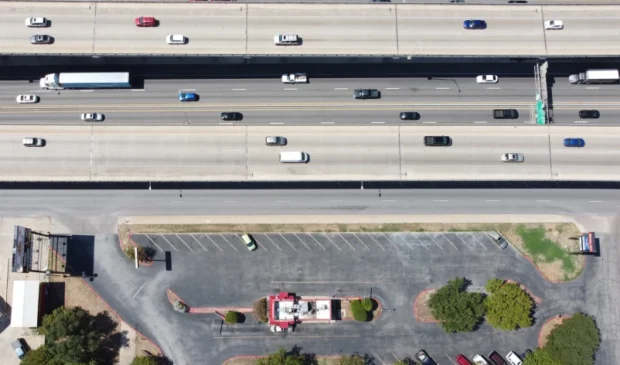Opponents of the Texas Department of Transportation’s (TxDOT) plans to widen Interstate 35 from Ben White Boulevard to U.S. 290 East are taking their fight to federal court. The legal complaint echoes calls heard at rallies and from local elected officials against one of the largest road projects in Austin’s history.
The group of 16 plaintiffs — led by the anti-highway activist group Rethink35 — argues that TxDOT turned a blind eye to the environmental injustices of the project, failed to explore less disruptive alternatives and glossed over the effects on air and water quality.
The legal complaint also zeroes in on TxDOT’s plans for seizing land on the shores of Lady Bird Lake. A 1.2-acre chunk of Waller Beach Park will be used as a construction staging area, then a TxDOT maintenance base. Federal law requires the parkland be replaced, and TxDOT has been working with the city in the hunt for suitable land.
“For too long, TxDOT has ignored this community and has pretended like their needs, their wishes, their interests don’t matter,” said Adam Greenfield, cofounder of Rethink35.
TxDOT’s leader is vowing to fight the lawsuit and defend the $4.5 billion expansion.
“This is a project designed with the community and for the community,” TxDOT executive director Mark Williams said in a news release. “We don’t believe that the actions of these opponents have merit. TxDOT intends to continue to press forward to deliver the I-35 Capital Express Central project.”
The transformation of I-35 is on track to begin this summer. The state plans to add four lanes along 8 miles from Ben White Boulevard to U.S. 290 East. Those “managed lanes” — two in each direction — would be reserved for vehicles with two or more people, first responders and Capital Metro buses.
Among the big changes, TxDOT will lower the main lanes from downtown to Airport Boulevard. The city of Austin and UT Austin are planning to spend hundreds of millions of dollars to cover the highway trench with large decks called “caps” that might support buildings, effectively concealing the widened interstate beneath a tunnel through the core of the city.

Nathan Bernier/KUT News. The main lanes of I-35 will be lowered through downtown as the highway’s footprint is widened.
TxDOT said the renovations are desperately needed on a highway that hasn’t had a major upgrade since the upper decks were added in 1975. Supporters of the expansion, including Austin Mayor Kirk Watson, see lowering and capping the highway downtown as a way of undoing some of the harms caused by the concrete barrier erected in 1962.
Opponents point to scientific research and historical evidence showing that increased highway capacity incentivizes suburban sprawl, encourages more people to drive, worsens air quality and escalates greenhouse gas emissions, intensifying global warming.
Rethink35 escalated its fight against the expansion by simultaneously filing a civil rights complaint with the Federal Highway Administration. The complaint draws on the history of I-35 as a racial dividing line, arguing that perpetuating and expanding the highway is knowingly engaging in acts of discrimination. Rethink35 set up a website inviting people to add their names to the complaint.
This legal effort is more coordinated than Rethink35’s last shot at blocking the I-35 widening. That failed lawsuit — launched in 2022 and abandoned in 2023 — claimed the state illegally split the highway expansion into three parts to evade stricter federal environmental scrutiny. The two other segments of the I-35 expansion through Travis County are already being built north of U.S. 290 East and south of Ben White Boulevard.
Rethink35 said the lawsuit filed on Friday will be more expensive than the last attempt. Some attorneys are working for free. Others are not. An online fundraiser is seeking $20,000 in donations.
“This [lawsuit] is what we have to do in order for action to happen,” said Bertha Rendon Delgado with the East Town Lake Citizens Neighborhood Association, one of the plaintiffs in the suit. “TxDOT has not listened to the community.”

Nathan Bernier / KUT News Bertha Rendon Delgado with the East Town Lake Citizens Neighborhood Association, one of 16 plaintiffs in the lawsuit, said the I-35 expansion would perpetrate racism and displacement.


